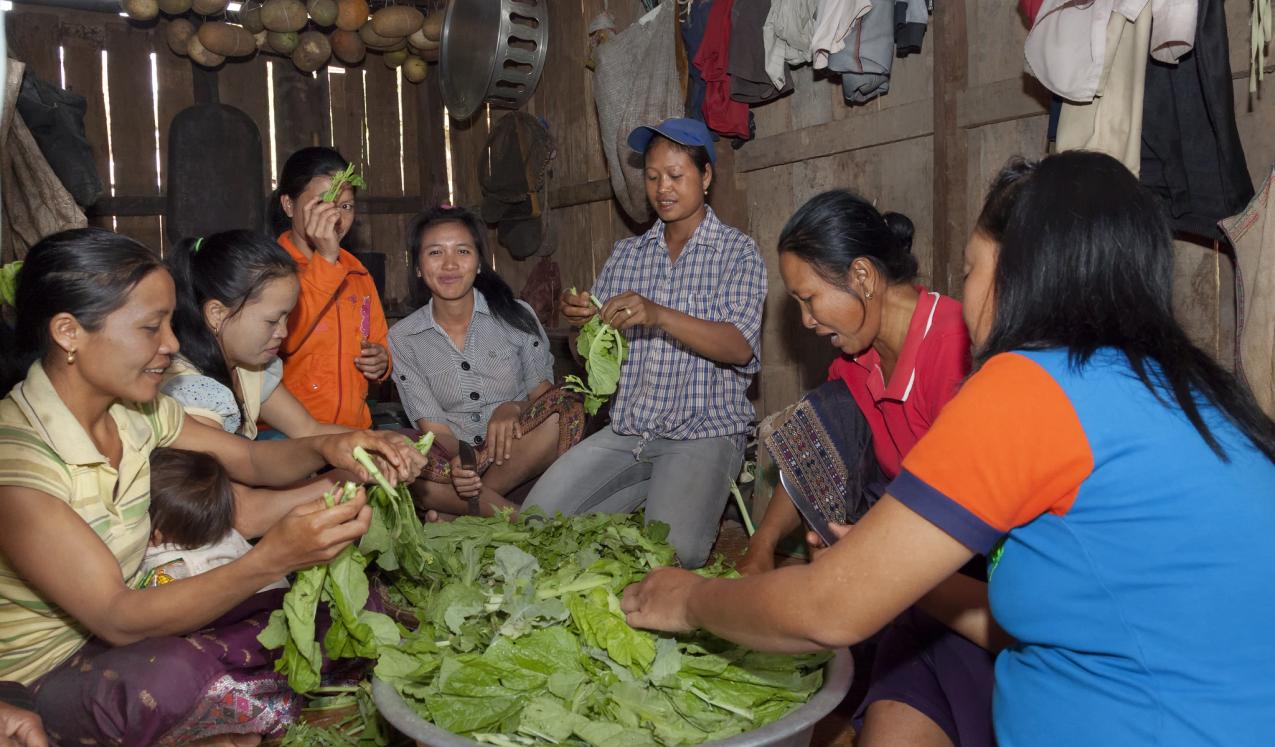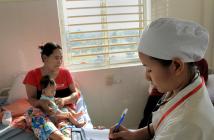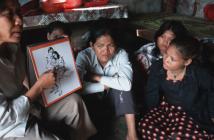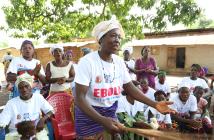
Gender norms and nutrition
Research into food and nutrition has identified—very explicitly— the harmful role of discriminatory gender norms. These norms affect access to food, food preferences and restrictions, and body image and eating disorders. Women in resource-poor settings experience elevated rates of food insecurity, poor food distribution and poor intake of micronutrients. In resource-rich settings, women account for most of those with eating disorders cases and experience pressure to appear and act feminine through diet and exercise. Furthermore, men who conform more closely to traditional masculine gender norms, may suffer from increased muscle dissatisfaction and engage in risky health behaviours in order to achieve a body ideal.
Research on overcoming undernutrition and food insecurity has resulted in programmes that include empowering women to participate and lead in the realm of agriculture and farming. The outcomes appear to be multiple in nature: women take a more active and involved role in their families and communities; agriculture and farming provide an opportunity for economic empowerment; and small-holder farming provides greater food security for members of the community. In addition, women enhance their autonomy and self-reliance, while they also enjoy elevated status in their communities as a result of their active participation in income-generation for their households.
Other types of intervention include those that provide cash. While cash transfers are a widely-used method to alleviate poverty in low-income countries, they have also been identified as a possible way to improve both nutrition and gender equity. Cash-based interventions related to food security and nutrition will often run alongside food assistance trainings, livelihood programmes and school feeding. These programmes rely less on women's farming practices and more on education and on enabling participants to buy more and better-quality (therefore nutritious) food for themselves and their families.
Research into the gendered roles that shape eating disorders and body image typically taken place in high-income countries
Research into the gendered roles that shape eating disorders and body image have typically taken place in high-income countries (HICs). Because the prevalence and associated research into eating disorders and body image issues are new and emerging in low- and middle-income countries (LMICs), little or no attention has been paid to changing the gender norms that influence these challenges. Evidence of programmes that address gender roles to improve eating disorder health outcomes has mostly come from HICs. The research that has been undertaken has focused on group-based activities and discussions and tends to be led by a facilitator.
A variety of reviews and articles have studied the impact of gender norm change or transformation on food security and nutritional health outcomes. Some interventions, such as the three outlined below, are representative of programming that identify 'gender norm change' explicitly as the motivation for the study. Other programmes, such as cooking oil in exchange for school attendance by girls, are also used to elevate the status of adolescent girls and women to change gender norms.
Such interventions do not, however, have gender norm transformation as an explicit objective. The three programmes outlined below are: Friis-Hansen's 2012 study of farmer field schools in western Kenya as a site to promote women's active participation in agricultural work; the World Food Programme's 2019 review of cash-based interventions for food assistance in LMICs; and Brown and Keel's 2015 study of the gender role-component treatment of eating disorders among gay men in the southern United States.
Less noise in the household: the impact of Farmer Field Schools on Gender Relations (2012)
The presence of Farmer Field Schools (FFS) in east Africa has grown in popularity, with 3,000 schools operating as recently as 2012. FFS are non-formal, educational groups that use collective action to teach farming techniques to community members. FFS employ curriculum-based courses and are instructed by a facilitator who encourages active participation, leadership and discussion from the members of the group.
The ultimate goal of the schools is to increase informed decision-making on crop-growing and livestock management. FFS also provide an interesting point of intervention and site of gender-transformative potential: focus groups are usually mixed-sex and require the full participation of each of member. In addition, the curriculum discusses sensitive topics, such as HIV/AIDS, domestic violence and alcoholism. FFS have, therefore, been used to study the effectiveness of gender-equity messaging and widening the role of women and men in the sphere of food production.
Friis-Hansen et al. studied FFS groups and their members in the Kakamega district of western Kenya. Through individual interviews with current members or recent graduates of FFS courses and group discussions, the researchers were able to collect and analyse primary data on the impact of these workshops on gender-role transformation. The resulting data showed that the collective action structure of the FFS (individuals uniting to achieve a common goal of improved crop and livestock conditions) allowed women to fulfil roles traditionally ascribed to men in order to reach a collective goal.
This enabled men to conceptualise the abilities and power of women in society and everyday life. They also took up roles traditionally ascribed to women, including weeding, planting, child-rearing, cooking, and fetching water and firewood. Furthermore, women in the FFS were required to lead and facilitate group discussions and even interrupt male participants to allow others to contribute. While such behaviour was not socially acceptable, the FFS setting provided a space where women led and collaborated with men who were not necessarily their partners. The FFS can, therefore, create a social space where gender norms and relations can be challenged and changed to empower women in their households and communities.
Men realised that a woman is just as capable as a man
Multiple participants noted the changes in household gender roles and attitudes. Men noted that despite societal perceptions that women are unwise, incapable and in need of guidance to complete work successfully, they realised that a woman is just as capable as a man and that they too can alleviate poverty through their work and empowerment.
At the same time, women expressed excitement in participating in farming practices, perceived themselves as effective and capable workers and felt empowered after completion of the FFS. They also reported that men spent less time drinking.
This intervention assessed the transformative potential of group-based learning to change traditionally-set gender roles, using agriculture and farming as the site of transformation. As such, women's involvement in small-holder farming establishes their involvement in their area's main economic activity and contributes to their food security.
The potential of cash-based interventions to promote gender equality and women’s empowerment (2019)
Shifting gender norms does not always rely on targeted, community-based messaging. Gender norms may also transform when the position and rights of women within society change.
As a result of patriarchal social structures, men typically act as primary decision-makers in their families or communities. Cash transfer interventions that target individuals and households have been proposed and studied as a possible intervention to provide women with more autonomy and, therefore, improve food security and nutrition-related outcomes. In relation to food insecurity, a cash-based transfer programme can have the dual effect of providing food security and improved nutrition-related outcomes as well as outcomes that are gender-transformative.
A multi-country study by the World Food Programme (WFP) analysed the effects of cash-based interventions run by local civil society organisations to support people in different food insecure settings, including ultra-poor women, young women and men, school-aged boys and girls and food-insecure households, depending on where the programme was located. The study included programmes with different features in six countries: Bangladesh, Egypt, El Salvador, Jordan, Mali and Rwanda.
The researchers studied which programme components were most important for improving food security and gender equity within households. All interventions included complimentary nutrition- or food-related programming, such as gardening and farming, or nutrition and food-distribution awareness training. After several months of qualitative data collection, WFP researchers identified the most significant components for improving nutrition and health outcomes.
Gender-inequitable norms impact the health outcomes of the entire household
The cash-based transfer programmes in Bangladesh, Egypt, El Salvador and Rwanda were most successful at generating a transformative gender role change. Of these programmes, the first three targeted individuals who fulfilled food-related training programmes that were conditional to receive cash. Participants pointed out that the use of programme activities (and specifically awareness-raising, training and support groups) was most important element in improving gender equity outcomes. In awareness-raising sessions, participants (female, male and children) learned about the ways in which gender roles impact the nutrition of different family members and how gender-inequitable norms impact the health outcomes of the entire household. The WFP found that participants in all programmes had more and better-quality food to eat, regardless of whether there was a food- or nutrition-related training conditionality or not.
The cash modality, however, is the factor that enabled their participation in the programming and was essential as a pre-condition to undergo the group-based, gender-transformative activities. Women received the cash, justifying their participation in programmes to their husbands who held the gendered belief that women should not take part in activities outside of the house.
In the Bangladeshi case study, ultra-poor women were given cash as compensation for completion of a livelihoods programme that focused on their training for future employment. The programme also included additional awareness-raising sessions and showed participants how gender impacts the amount and time women can eat in family settings.
Women were able to take time away from their households and, first through cash transfer during the programme and then through income generation after its completion, provide more and better food for themselves and their families. The additional income elevated their status in their families and their newly esteemed positions motivated family members to share meals more equitably, potentially improving their nutrition. The study concluded that cash-based interventions are most successful at improving nutrition and food security when the causes of social inequality are addressed explicitly in the programme design.
A randomized controlled trial of a peer co-led dissonance-based eating disorder prevention program for gay men (2015)
Eating disorders and negative body image have been framed consistently as health issues that largely affect women. Over time however, there has been an incremental rise in eating disorders in men and, in the present day, males represent up to 33% of all eating disorder cases in the United States. The increasing prevalence of such cases in men challenges the idea that body ideals harm only women and indicates that the gender norms that shape ideals around physical appearance can also have a negative effect on men.
Gay men are affected disproportionately by negative body image
Gay men are affected disproportionately by negative body image (in comparison to straight men) as a result of simultaneously pursuing body ideals to attract sexual partners and regular bodily comparison with other gay men in their community. The resulting ideal is a thin, muscular body type that is supposedly achieved through the use of steroids, caloric restriction and excessive exercise. Prevalent gender norms in the American gay community emphasise this body ideal alongside masculine behaviours and attitudes, whether within themselves or in their sexual or romantic partners. As a result, gay men in the US are estimated to account for 5% of the total male population, yet account for 42% of male eating disorder cases.
The study by Brown and Keel (2015) focused on the higher prevalence of eating disorders among gay men in the southern United States. They sought to build upon the success of cognitive dissonance-based (DB) interventions on women with eating disorders. In the context of eating disorders, DB intervention exposes the competing and conflictual ideals that are held, such as feelings of dissatisfaction in one’s own body and the understanding that the thin-ideal is an unachievable, unhealthy reality. Brown and Keel adapted a study that challenged these distinct issues specific to gay men and their associated gender norms, such as a thin, muscular-ideal body type.
A randomised control trial was used, with the participants assigned to one of two groups: one that underwent DB programming and a control group. The DB group experienced two group-based sessions led by gay male facilitators and focused on the expectations present in the gay community. Group discussions allowed space to criticise the pressures that gay men experience and to foster positive language and body acceptability. The result was that the DB group experienced decreased body dissatisfaction, drive for masculinity, bulimic pathology and objectification compared to the control group, immediately after intervention and over the following four months. In relation to gender roles in the gay community, the DB group also showed a reduction in desire to meet masculine behaviours, less internalisation of body ideals and decreased self- and partner-objectification.
Brown and Keel’s research, therefore, affirms the success of cognitive-based interventions in the treatment of eating disorders. It also highlights the need to use group activity and discussion to counter gender-norm expectations of gay males and other specific populations.



